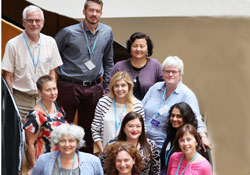Laboratory mentoring for quality systems implementation under the Better Labs for Better Health initiative: 2016 in review

WHO
A key method for effective and efficient strengthening of medical laboratories is the implementation of a laboratory quality management system (LQMS) based on the international quality standard ISO 15189:2012. In 2014, WHO launched a web-based tool that guides laboratories through the practical day-to-day implementation of an LQMS: the Laboratory Quality Stepwise Implementation (LQSI) tool.
Even though the use of the LQSI tool minimizes the need for external assistance in the implementation process, regular mentoring remains crucial. During these mentoring visits the mentors can answer questions, help to develop action plans to overcome obstacles, perform external audits and provide training.
Mentoring activities are currently taking place in 7 laboratories in the WHO European Region, and will expand to include 2 additional laboratories in early 2017. Below is a summary of activities that took place in 2016.
- Following their first visit in November 2015, 2 mentors conducted 3 additional visits to the Laboratory of Molecular Virology and Genetic Engineering at the Research Institute of Influenza in St Petersburg, Russian Federation. Over the course of these visits, laboratory staff established a quality group that meets regularly, completed or closed 35 of 66 identified actions, and wrote many standard operating procedures for test methods and biosafety. They are currently focused on developing a document control process and implementing a laboratory information management system.
- 2 mentors conducted 3 visits to the Bacteriology Laboratory at the Center of Quarantine and Especially Dangerous Infections (CQEDI) and to the Clinical Diagnostic Laboratory (CDL) at the Republican Diagnostic Centre, both in Bishkek, Kyrgyzstan. They provided introductory training on the LQSI tool and, during their third visit to CQEDI, offered an additional session in the context of practical implementation. As a result, staff at CQEDI wrote 70 standard operating procedures, including for analytical and biosafety procedures, and created electronic databases for inventory and equipment. CQEDI is also in the process of developing a document control system. Staff at CDL concluded that introducing LQMS in this national-level laboratory – led by the chief laboratory doctor of the Ministry of Health – has the potential to drive forward improvements in the national clinical laboratory network. These improvements include developing and implementing national training courses for laboratory personnel in quality management, risk management and biosafety; establishing national external quality assessment programmes; and strengthening the focus on interaction with customers.
- 2 mentors conducted 2 visits to the Department of Zoonoses and Influenza at the State Research Centre of Virology and Biotechnology VECTOR in Koltsovo, Novosibirsk Region, Russian Federation. These visits were notable for the staff’s enthusiasm for LQMS and their progress in implementing it, thanks to the keen assistance of support units such as Quality Assurance, Human Resources, Safety, and Equipment Maintenance.
- Mentors also made first visits to the National Public Health Laboratory and to the Virology Laboratory at the Scientific Research Institute of Preventive Medicine in Dushanbe, Tajikistan. After the visit, laboratory staff felt well prepared for LQMS implementation and highly motivated to work towards ISO 15189:2012 accreditation. Based on insight gained from laboratory assessment and gap analysis, they developed detailed quality implementation plans for both laboratories for the period leading up to the next mentoring visit.
- A mentor made a first visit to the Virology Laboratory of Mater Dei Hospital in Msida, Malta. Staff were very motivated to improve laboratory quality management, and other sections were also interested in participating. A quality team was set up to help the virology department with the accreditation process by facilitating cooperation and information exchange.
- During a scoping visit to the Virology Reference Laboratory at the Centre of Public Health and Nutrition in Ashgabat, Turkmenistan, it was identified as a good candidate for support. A first mentoring visit is planned for early 2017.
All of the mentoring visits in 2016 included training in WHO’s LQMS. These visits were highly appreciated by laboratory staff for their combination of theory and implementation.
Funding for visits to the WHO-recognized national influenza centres in Malta and the Russian Federation, and to the WHO H5 reference laboratory at VECTOR, was provided by the Pandemic Influenza Preparedness Framework Partnership Contribution. Visits to the laboratories in Kyrgyzstan, Tajikistan and Turkmenistan were supported by the European Union (European Commission’s Directorate-General for International Cooperation and Development) as part of the project on strengthening health laboratories to minimize potential biological risks (contract IFS/2013/332312).



